"That Shit Might Fly In The City...." (Episode Deux)
Being MAGA means never having to say you're sorry...or tell the truth
Try that in a small town
See how far ya make it down the road
Around here, we take care of our own
You cross that line, it won't take long
For you to find out, I recommend you don't
Try that in a small town
Jason Aldean, “Try That In A Small Town”
A few days ago, I wrote about country music star Jason Aldean going full-on, unapologetic MAGA in his latest video, “Try That In A Small Town.” To say the song and the video were controversial would be something of an understatement. It means that Aldean gets to laugh all the way to the bank. Controversial = clicks = eyeballs = downloads= concert ticket sales= shit-tons of money.
Yeah, Aldean’s not worried about where his next Big Mac’s coming from.
This is not a song stemming from Aldean’s personal experience. He was born and raised in Macon, GA (pop. 157,346). I don’t know how you might define “small town” (I grew up in a town of 941), but Macon ain’t it. And while Aldean recorded the song, he didn’t write it. The writing credits belong to Kelley Lovelace, Neil Thrasher, Tully Kennedy, and Kurt Allison.
Aldean’s producer handed him the song. He sang it, performed in the video, and now everyone associated with it is getting rich.
Don’tcha just LOVE AmeriKKKa!!!
Given how Aldean presents the song in the video, it’s all somewhat disingenuous. As a writer, I understand “artistic license,” but Jason Aldean isn’t from a small town. He wasn’t born, raised, or lived in one. Does that make the sentiments contained in the song somewhat dishonest?
It does. He’s talking about things that might happen in a small town as if he has first-hand knowledge when there’s no way he could know what happens in small towns. How could he? He’s never lived in one.
“Try That In A Small Town” evokes some stark and violent images…and that’s just in the lyrics. The video removes any question as it returns to the unrest of the summer of 2020, something those of us here in Portland remember all too well.
Fortunately, the country music world isn’t pure MAGA. Some artists associated with Nashville have been willing to call out Aldean for his undeniable advocacy of violence and borderline racism.
Jason Isbell and Jake Owen got into a Twitter spat over the weekend about Aldean’s song and video, and while I come down solidly on Isbell’s side, I’m happy for the dialogue. For too long, Nashville has been reflexively Right-wing, and anyone not White, Conservative, Christian, and heterosexual has seen their career quickly circle the drain.
When country singer Chely Wright came out as a lesbian in 2010, it resulted from years of anguish, and her promising career plateaued. Though she’s happy and in a much better place, her public coming out probably cost her dearly in a still-Conservative Nashville.
Isbell makes a good point. Jason Aldean is singing about something he knows nothing about. He didn’t write the song, grow up, or ever live in a small town. Yet he’s singing a song whose lyrics are incredibly divisive and an invitation to physical violence as if that’s how disputes are resolved in a small town.
This would seem to be confirmed by Jake Owen’s response that you “walk up to the guy and be a man to his face if you want the smoke.” So, if you live in a small town, you can’t disagree with someone unless you’re willing to risk physical violence. Seriously? That was never my experience.
Right. Thanks for confirming my theory. And for being ridiculous.
And Jason Isbell isn’t the only one speaking out against Aldean’s song and video. Sheryl Crow also called the song “not American or small town-like.” And as someone who grew up in a small town, I find it difficult to argue with her. Where I grew up, people didn’t get in each other’s faces when disagreements occurred. They acted like adults because they had kids to set an example for.
Never mind that we all had to live and work together in our small town.
For his part, Jason Aldean denies that he wrote a “pro-lynching” song. And he’s right…because HE DIDN’T WRITE THE SONG. He did, however, sing a song that glorifies violence as a way to solve problems.
Proving that the only bad publicity is no publicity, “Try That In A Small Town” just hit #2 on the Billboard Top 100 chart AFTER the song was pulled from CMT, and critics savaged it for glorifying racism and violence.
Once the media picked up the story, everyone (including me) needed to hear the song, and…well, you know how that goes….
This isn’t the first time Aldean has drawn fire for pushing far Right-wing views. His wife, Brittany, was once referred to by singer Maren Morris as “insurrection Barbie.” Brittany Aldean has also developed a not-undeserved reputation for transphobia.
And when confronted for her transphobic comments, Brittany Aldean made no effort to walk anything back. She’s doubled down, making clear her anti-transgender stance:
But Aldean, who is known for her YouTube makeup tutorial videos and is the co-founder of a clothing line aimed at conservative consumers, didn’t stop there. In a…post on her Instagram Stories, she amplified her stance with even more eyebrow-raising language.
“Advocating for the genital mutilation of children under the disguise of love and calling it ‘gender affirming care’ is one of the worst evils. I will always support my children and do what I can to protect their innocence,” she wrote, as seen in screenshots of the post circulated on social media. “Some parents want to be accepted by society so badly that they’re willing to make life-altering decisions for their children who aren’t old enough to fully comprehend the consequences of those actions.”
Thankfully, many in Nashville have evolved enough to understand that Brittany Aldean’s comments represent the worst sort of self-superior transphobia.
Among the first to address Aldean’s transphobia was musician Cassadee Pope.
“You’d think celebs with beauty brands would see the positives in including LGBTQ+ people in their messaging,” she tweeted…. “But instead here we are, hearing someone compare their ‘tomboy phase’ to someone wanting to transition. Real nice.”
Not one to let things lie, Aldean responded:
“Love is protecting your child until they are mature enough as an adult to make their own life decisions,” she continued, tagging Pope. “Thankful my parents allowed me to go through my tom boy phase without changing my gender.”
So there you have it. One Aldean is singing a song and recording a video about a subject he knows nothing about…all while laughing all the way to the bank.
The other Aldean is auditioning for Mrs. Transphobic Nashville and doesn’t care who knows it.
They’re both to be found on the far Right-wing and are too arrogant and ignorant to concern themselves with who may be getting hurt. They’re making money, and that’s all that matters.
Those of us who grew up in a small town understand that it’s not so different from growing up in a city. There are fewer people; we look out for one another and do our best to get by with minimal conflict. People are people; there just aren’t as many Starbucks locations.
What we don’t do is run around with our granddaddy’s gun looking to kick ass and take names because we feel someone disrespected us. We don’t go through life with a chip perpetually balanced on our shoulders. We have dreams, aspirations, and problems like everyone else. And we don’t have to go through life angry and looking to justify our existence by beating up our fellow humans out of some vague sense of desperation and futility.
In case any listener is too dense to catch the “us against them” vibe of Real Americans versus urban others, Aldean also assures us that his grandpappy’s gun, which we are given to believe shall be pried from only the coldest and deadest hands, is ready for deployment in the cause of taking care of our own.
Small-town America is a staple of American popular song. Somehow singers from velveteen Bing Crosby to gnarly Steve Earle and transcendent Dolly Parton have managed to conjure it without invoking vigilantism or reaching for their firearms. Aldean’s lyrics – written by a team that did not include Aldean – are accompanied by the kind of six-string screech familiar from halftime ads for the December sales event. The generic twang of the guitars underscores just how discordant the words are. Variety critic Chris Willman described the package as “close to being the most cynical song ever written about the implicit moral superiority of having a limited number of neighbors.”
Perhaps this is all because Jason Aldean knows nothing about small towns. After all, Macon, GA, is anything but small. Not only that, but he didn’t even write the song. All he’s doing is singing words; nothing comes from the heart except a desire for a bankable song.
He’s certainly found that in “Try That In A Small Town,” but it’s not because it’s coming from personal experience. Someone just handed him the music and lyrics, he performed it, and now he’s laughing all the way to the bank.
And, yes, it is “close to being the most cynical song ever written about the implicit moral superiority of having a limited number of neighbors.” What makes it so thoroughly hypocritical is that it’s performed by someone who’s never lived in a small town.
There’s no implicit moral superiority to having a limited number of neighbors and/or living in a rural area. Some folks may prefer that over living in a city, but that’s a personal choice, not an indication of superior moral fiber. Country music’s glorification of Small Town USA is little more than mythologizing and inflating the egos of those who are already inclined to see themselves as better people.
Whether Aldean’s song intentionally evokes “sundown” towns, which required Black people to be good and gone by nightfall, at which point White residents had license to let their worst impulses run wild, or is instead just a heartfelt paeon to violence against all, regardless of skin color or social station, who dare bring their citified ways across a small town’s borderline, is probably not worth an argument.
For his part, Aldean says it’s all a big misunderstanding. He released a statement complaining about his critics and noting, “ There is not a single lyric in the song that references race or points to it.”
There may be truth in Aldean’s words, but anyone who’s ever lived in a red state understands that racism is seldom overt. It rarely smacks you in the face. Its language and performance are often encoded, and those attuned to it can translate and understand its meaning.
This allows racists (like Jason Aldean, perhaps?) to maintain plausible deniability while also playing the racism game. They can claim to be offended at being accused of racism, while anyone who knows what to look and listen for knows they’re racists to their core.
The song, which was released in May, only seems to have caused a fuss once the video was released earlier this month. (We are a visual culture.) The video offered another chance to drive home the divisive plot line, and Aldean and his colleagues seized it. Shot in front of a courthouse in Columbia, Tennessee, the site of a mob lynching of an 18-year-old Black teenager in 1927 and a race riot in 1946, it shows Aldean and band singing. It also features footage of visceral conflicts between protestors and police, interspersed with footage of criminal acts. Apparently, no one in the editing room pondered whether exercising First Amendment rights and jacking an old lady’s car might be dissimilar activities in some important respects. The whole thing brought to mind some vintage rhymes from George Wallace’s 1972 presidential campaign[.]
There’s little profit to be found in open racism. Jason Aldean and anyone else who grew up in the South knows this. He was raised in a culture where Whites were seldom engaged in open racism but were nonetheless virulently racist behind closed doors and among trusted friends.
I believe there’s little doubt but that Aldean knew precisely what he was doing with the video and song. If the video hadn’t been released, the song likely wouldn’t have had much impact. Some folks might’ve protested the lyrics, but any outrage wouldn’t have gone far.
But, as Francis Wilkinson noted, we’re a visual culture. Combining the lyrics with the images of the video had an effect not unlike pouring gasoline on dying embers. It turned what would have otherwise been a song of little note into a controversial racist anthem.
The problem with Nashville is that there are too many knuckle-dragging troglodytes like Jason Aldean who can go sincerely full-on MAGA because much of country music’s fanbase still fits that demographic. It’s stereotypical, but not untrue- trucks, guns, Trump flags, MAGA hats, “Fuck Biden” bumper stickers- these are the kind of people who believe America is a socialist Hell-hole.
As they cash their Social Security checks and enjoy their VA benefits.
And they LOVE Jason Aldean, who loves them right back. Here was his response at a concert in Cincinnati, OH, on 7.21:
I gotta tell you guys, man: it’s been a long-ass week. It’s been a long week, and I’ve seen a lot of stuff. I’ve seen a lot of stuff suggesting I’m this, suggesting I’m that. Hey, here’s the thing, here’s one thing I feel: I feel like everybody’s entitled to their opinion. You can think something all you want to, it doesn’t mean it’s true, right? What I am is a proud American. I’m proud to be from here. I love our country, I want to see it restored to what it once was before all this bullsh*t started happening to us. I love my country, I love my family, and I will do anything to protect that, I can tell you that right now.
Here’s what I want to say: lotta things out there, and one thing I love, you guys know how it is this day and age, is cancel culture is a thing. That’s something that, if people don’t like what you say, they try to make sure they can cancel you, which means try and ruin your life, ruin everything. One thing I saw this week was a bunch of country music fans that can see through a lot of the bullsh*t, alright? I saw country music fans rally like I’ve never seen before, and it was pretty badass to watch, I gotta say, thank you guys so much.
Cancel culture? That’s what Conservatives whine about when they get busted for being hypocrites and assholes. There’s a name for the phenomenon; it’s called “consequence culture.”
While both Aldeans represent the very worst of America, they understand their niche and play to it skillfully. Jason knows his audience is MAGA Nation, and Brittany understands that Moms4Liberty types are hers. And they stay true to that.
(When Sebastian Gorka tweets his support, you know you have the worst of the worst in your corner.)
My challenge is that I’ve always enjoyed Jason Aldean’s music, even as I despise what he stands for as a person. I’ll keep my personal opinion to myself because it’s far worse than anything I’ve written here.
I’ll limit it to saying that I hope they both have reserved parking spaces waiting for them in Hell.





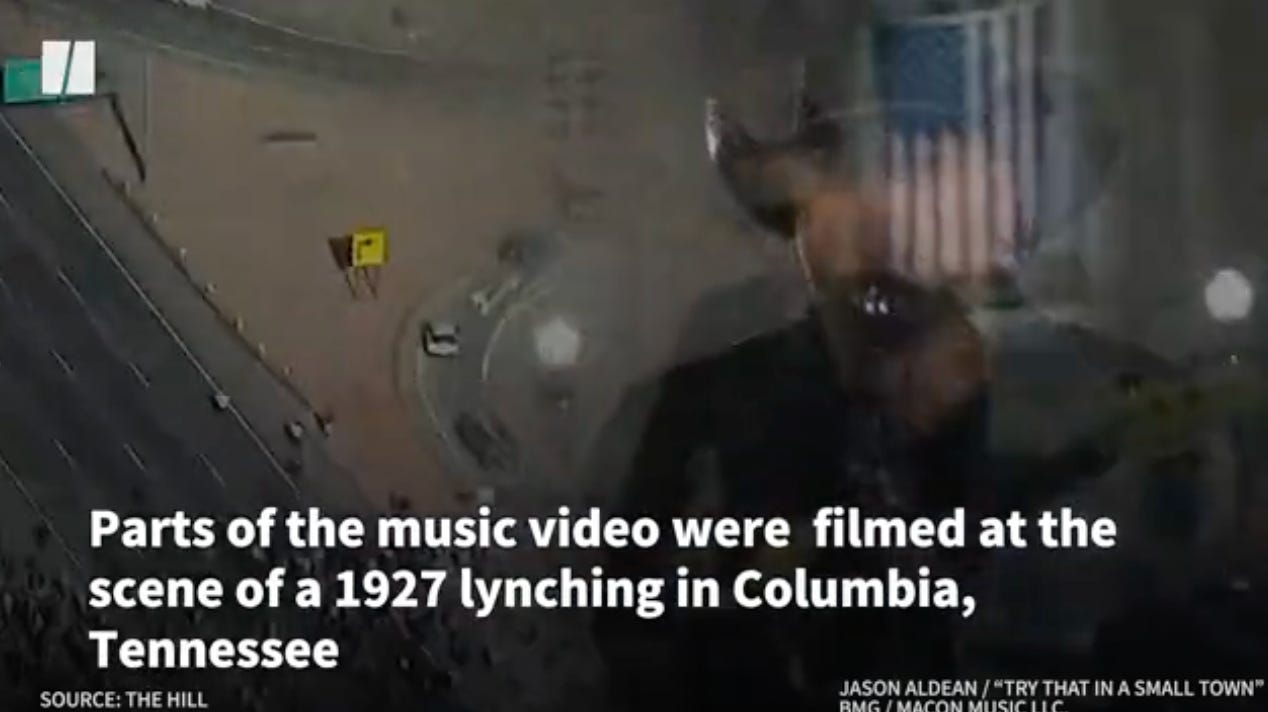
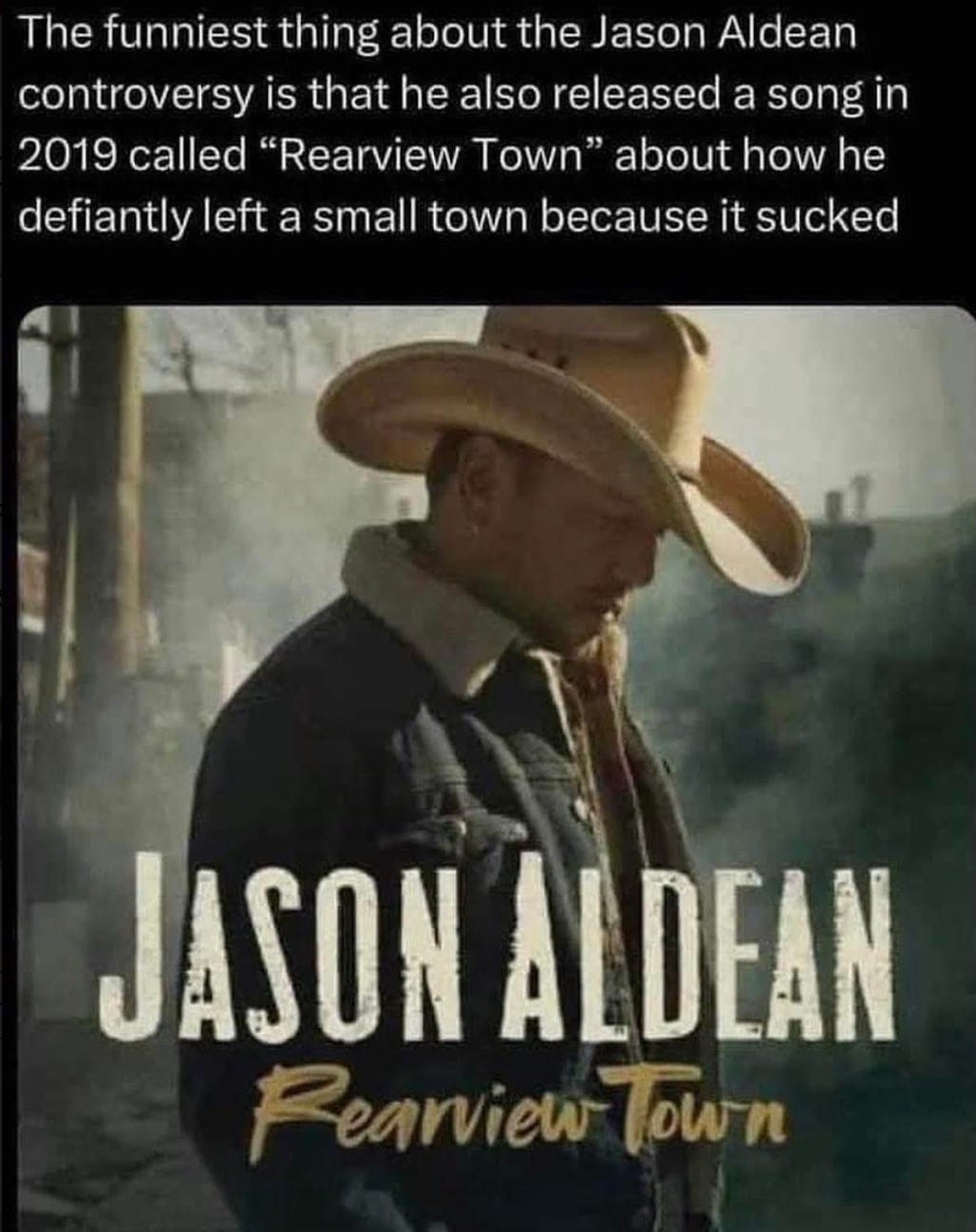
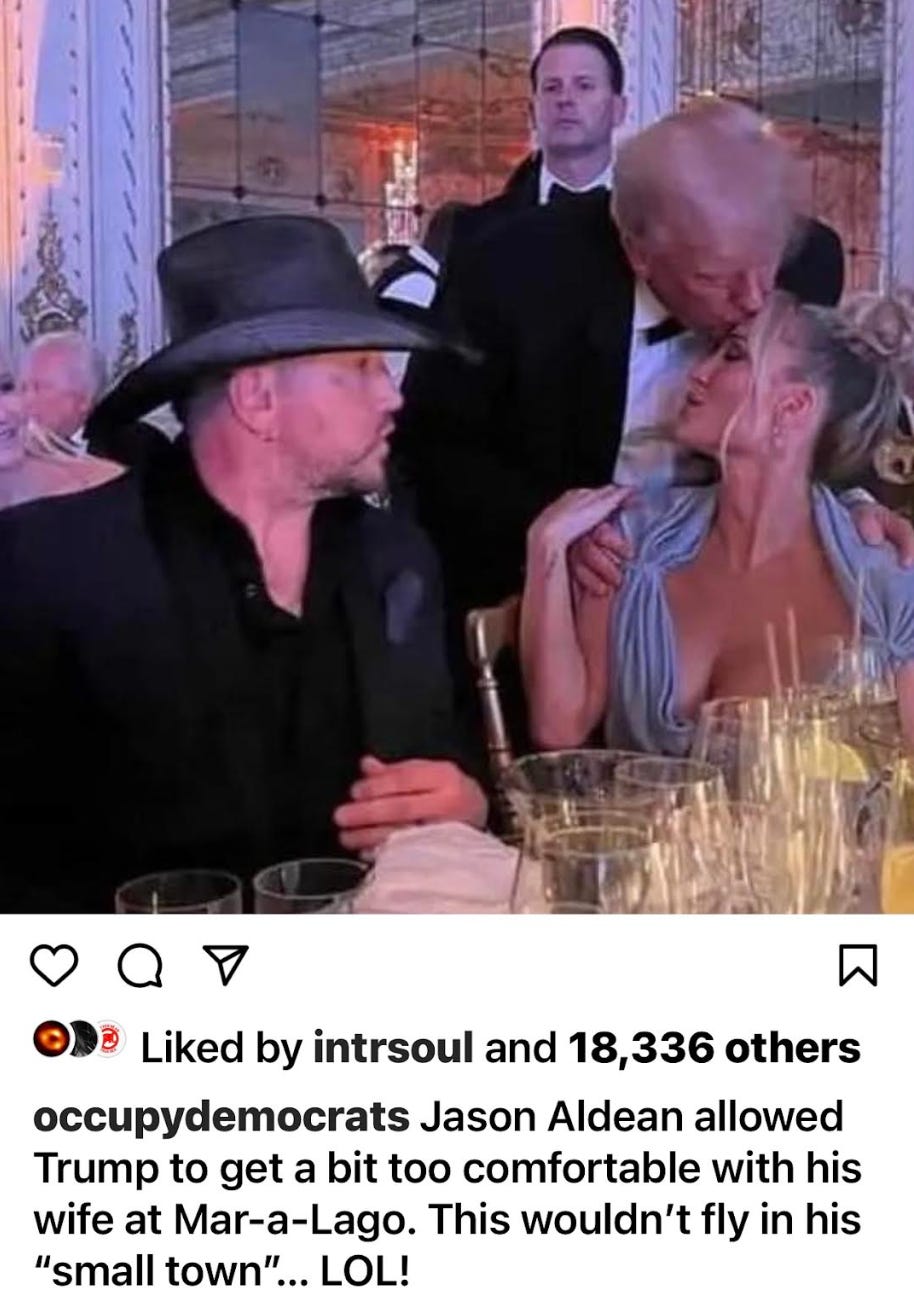
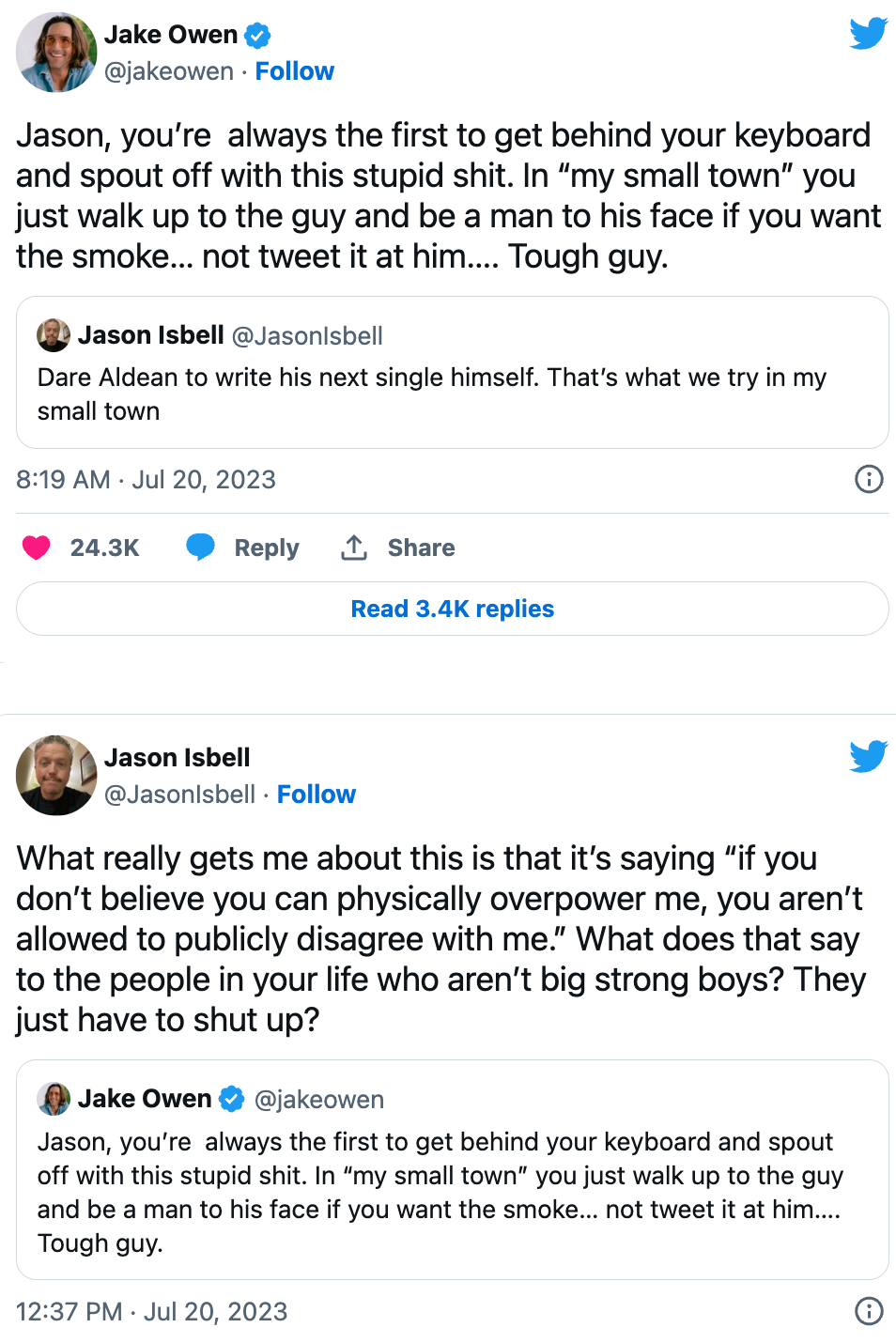
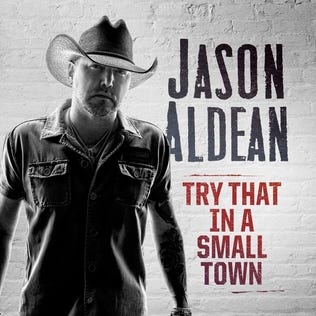
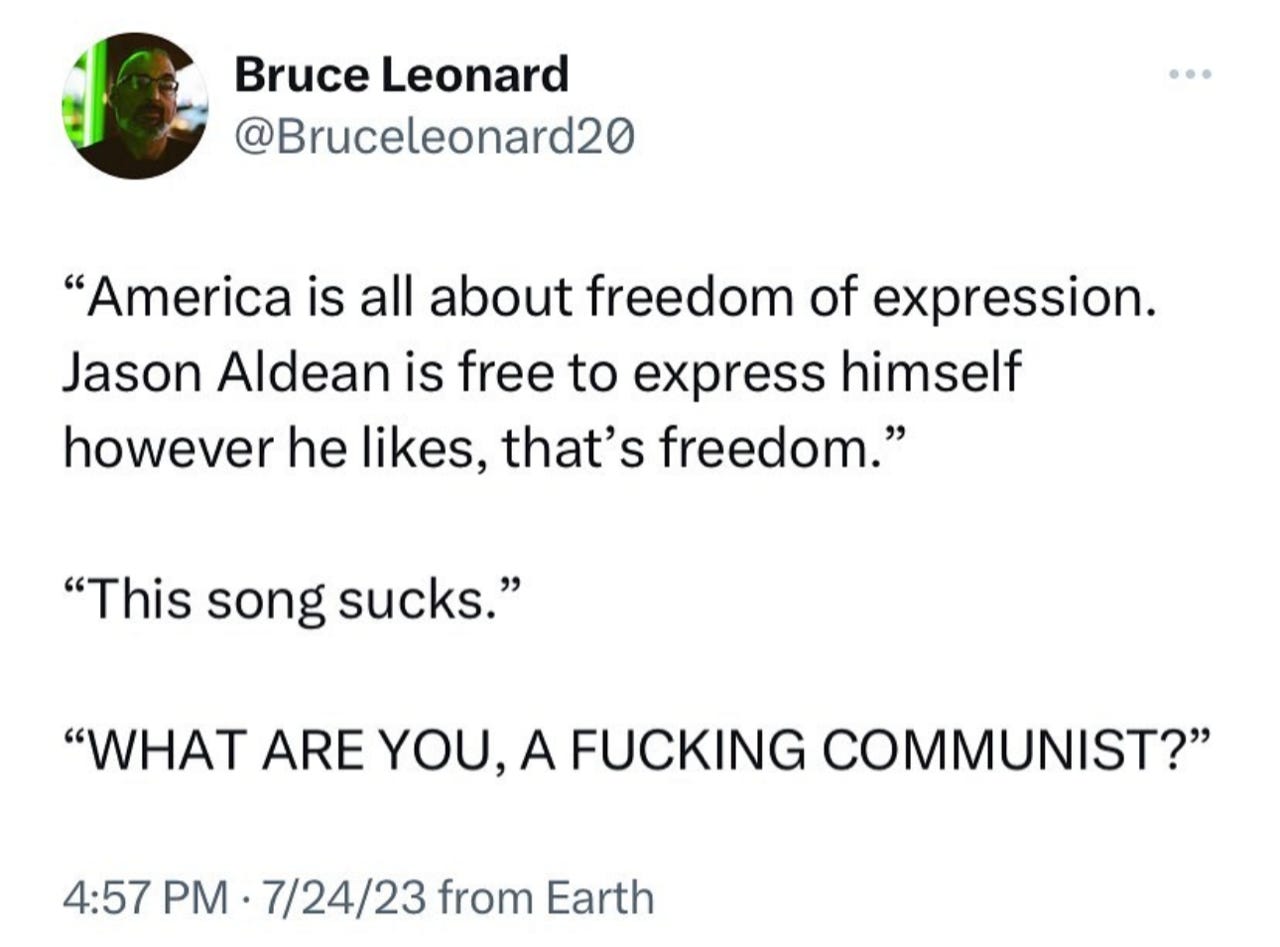
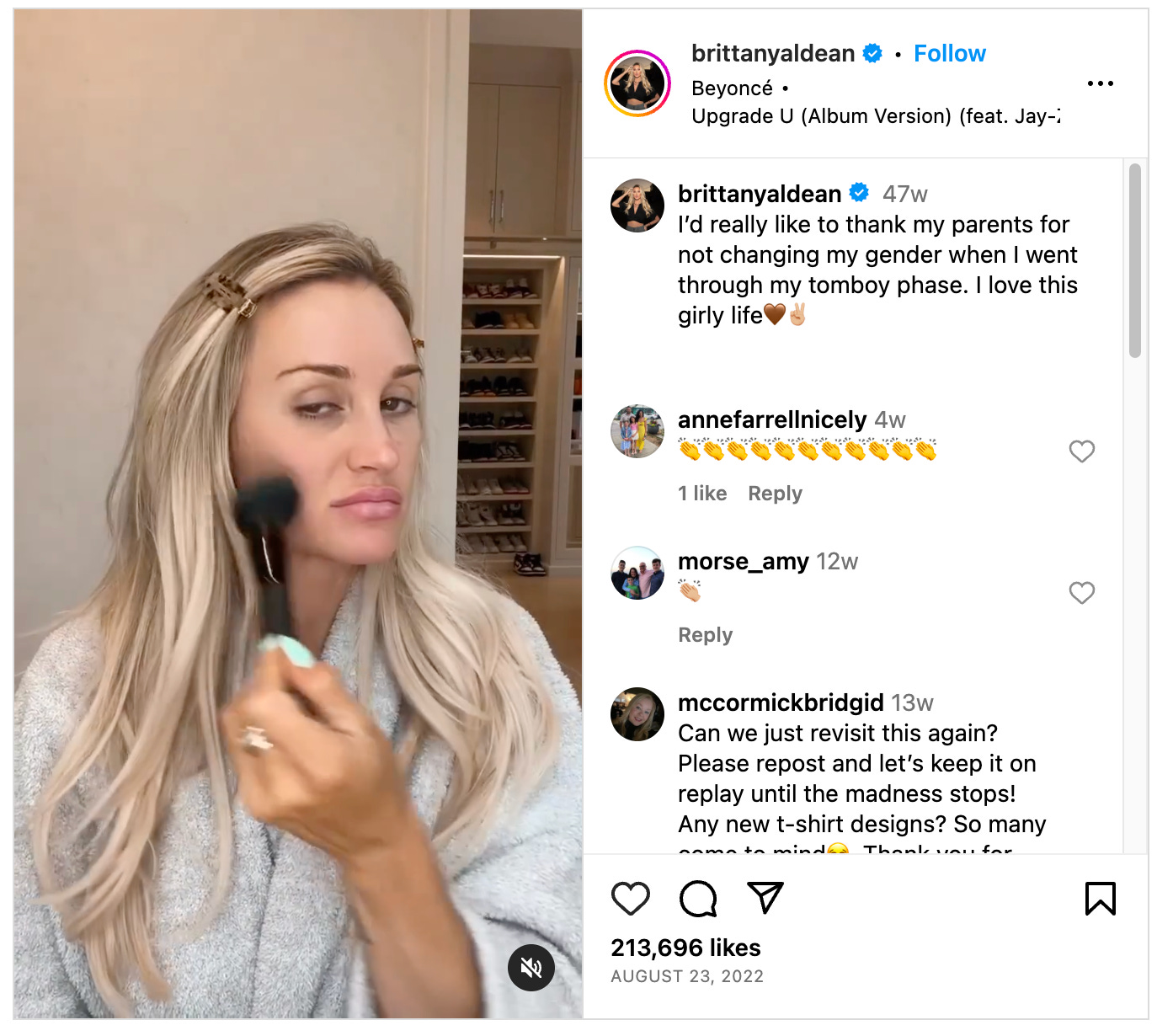
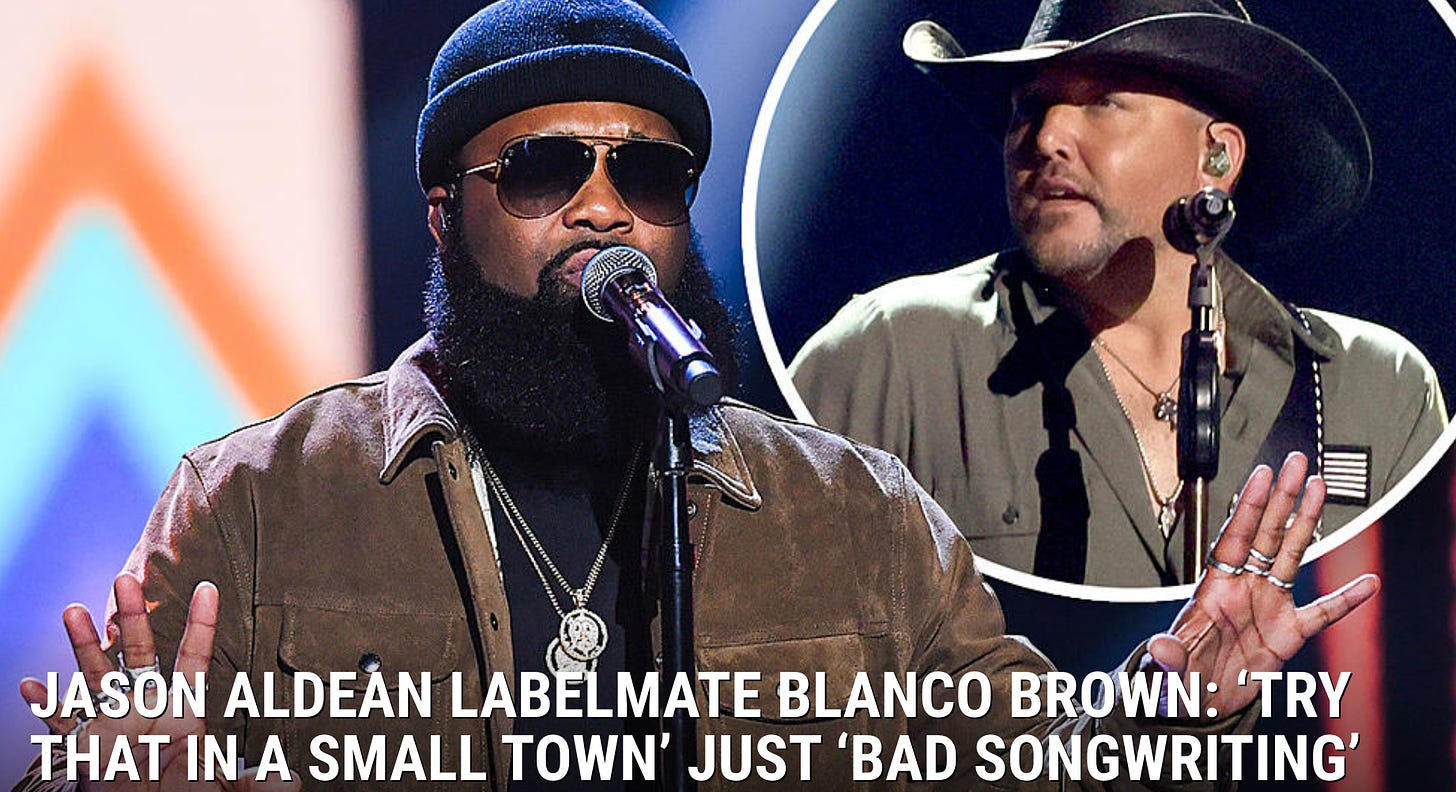
Coming from a long line: Merle Haggard ("Okie from Muskogie") is, in fact, from Bakersfield, CA.